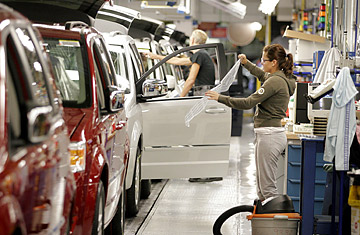
Chrysler's Windsor Assembly plant in Windsor, Ontario, Canada
Ontario, the industrial heartland of Canada and the home of Detroit North [its Detroit-allied auto industry], used to be considered the nation's growth engine. Now, it's become a have-not province eligible for federal transfer payments — money in part underwritten by oil-rich Newfoundland. It's an irony not lost on most Canadians, since Newfoundland has carried the mantle of neediness since joining confederation 59 years ago.
For Canadians, who don't like to see the traditional order upset, this kind of reversal is tantamount to hearing the Toronto Maple Leafs have been sold to Atlanta. (See pictures of the global financial crisis.)
Sure, next year Ontario will receive a paltry $283 million (C$347 million) from Ottawa's wealth-sharing program, but why has the country's most populous and arguably wealthiest province turned beggar? It's been a punishing combination of a strengthening currency and a weakening manufacturing economy.
For much of the year, the Canadian dollar, known as the Loonie after the lake-bird pictured on the one-dollar coins, was trading at par with the U.S. dollar. That squeezes manufacturers and grounds exports, since a strong Loonie deprives Canada of a cost advantage it has enjoyed for years. The Canadian dollar has weakened recently, but now the financial problems threatening to push Detroit's auto industry over the brink have also gripped the Canadian subsidiaries of GM, Ford and Chrysler.
See the 50 Worst Cars of All TimeSo far this year Canada has lost 5,000 vehicle-assembly jobs and 10,000 parts-supply jobs, almost all of them in the belt of southern Ontario that runs from New York to Michigan. GM Canada has been hardest hit, but it has yet to reap the worst of this whirlwind. The Oshawa, Ont.-based car company, which takes its marching orders from Detroit, expects to shed another 4,000 jobs with planned closures of a truck and transmission plant. This downsizing is needed to cope with overcapacity, but it's fostering bad blood between the car maker and its union. "We felt betrayed," says Chris Buckley, president of Canadian Auto Workers local 222, whose membership at GM Canada's assembly complex on Lake Ontario includes workers from the surplus truck plant. "It's never been this bad. We're on the verge of closing our doors."
Just as the Detroit Three are asking Washington for a financial lifeline, so too their Canadian counterparts want Ottawa to staunch hemorrhaging balance sheets. The difference is that in Canada the heads of the Detroit Three have left it to the CAW and the Auto Parts Manufacturers' Association to take the lead on a government bailout. "Obama is going to protect U.S. jobs," says CAW president Ken Lewenza, referring to President-elect Barack Obama. "The Canadian government has to play an active role or it could be left out in the cold manufacturing nothing."
What would Canada's Detroit Three, who export about 85% of their production south, do with a cash infusion — by some estimates anywhere from $2 billion to $4.3-billion? "They would cover payroll and hope things get better," says Alan White, an investment specialist at University of Toronto's Rotman School of Management. As a result, critics warn Ottawa and the Ontario provincial government against throwing good money after bad. "If there's a government bailout it will be helping companies at the center of losing jobs, and punishing companies who have created jobs," says veteran Canadian analyst Dennis DesRosiers of DesRosiers Automotive Consultants. The Detroit Three and their supplies have lost 55,000 jobs in Canada since 2000, compared with 40,000 jobs created by the Canadian assembly operations of Honda and Toyota.
Critics argue that if U.S. car makers have stopped making the vehicles people want to drive, it might not be such a bad thing to force GM to reinvent itself under Chapter 11 bankruptcy protection. However the wider, short-run repercussion might be too much to bear for the North American industry. "There's a real fear if one of the Detroit Three fails it will threaten the future of the others on both sides of the border," says Jayson Myers, president of Canadian Manufacturers & Exporters, the country's largest trade and industry association. Says Buckley of the CAW: "If GM fails, we'll lose hundreds of thousands of jobs in Canada. What kind of country are we leaving to our children?"
Canada will likely have no choice but to bail out Detroit North if Washington rescues its own car companies. Rewarding decades of abysmal management and arrogance with billions of taxpayers' dollars might seem wasteful, but at least in the short run it will save Ontario, whose fortunes rise and fall with Detroit, from sliding further down the economic ladder.
See pictures of The Great 1908 New York-to-Paris Automobile Race
